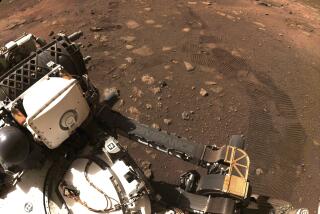‘Needed: a Space Policy’
- Share via
In your editorial you endorse a manned mission to Mars. You and your readers should be made aware that sending human beings to Mars is not just a question of rockets and money, but of human endurance as well. Recently, the Space Science Board of the National Academy of Sciences released a two-year study titled “Space Science in the Twenty-First Century.” The following are among its conclusions:
“It is important to recognize that the limitations on human survival in space are not well-known. At present, we are not certain that mission times can be extended greatly beyond those already experienced, even with considerable technological progress. Low gravity leads to loss of bone mass and other physical effects. High-energy, heavy ion radiation causes irreversible damage to cells, including brain cells. Human relationships in a small, isolated group can badly deteriorate and lead to the loss of functional capabilities. We have not demonstrated the feasibility of a closed ecological system yet, and resupply at a great distance for a long period could be formidable. We must address these issues before we can reach a final decision about the nature and extent of human involvement in expanding the frontier of space.”
And: “It would be imprudent even to plan extended missions until these serious medical issues are resolved.”
Many scientists believe that exploration of the solar system can be performed more effectively, at far less cost, and in an equally human way by the use of robotic machines.
N.H. HOROWITZ
Pasadena






